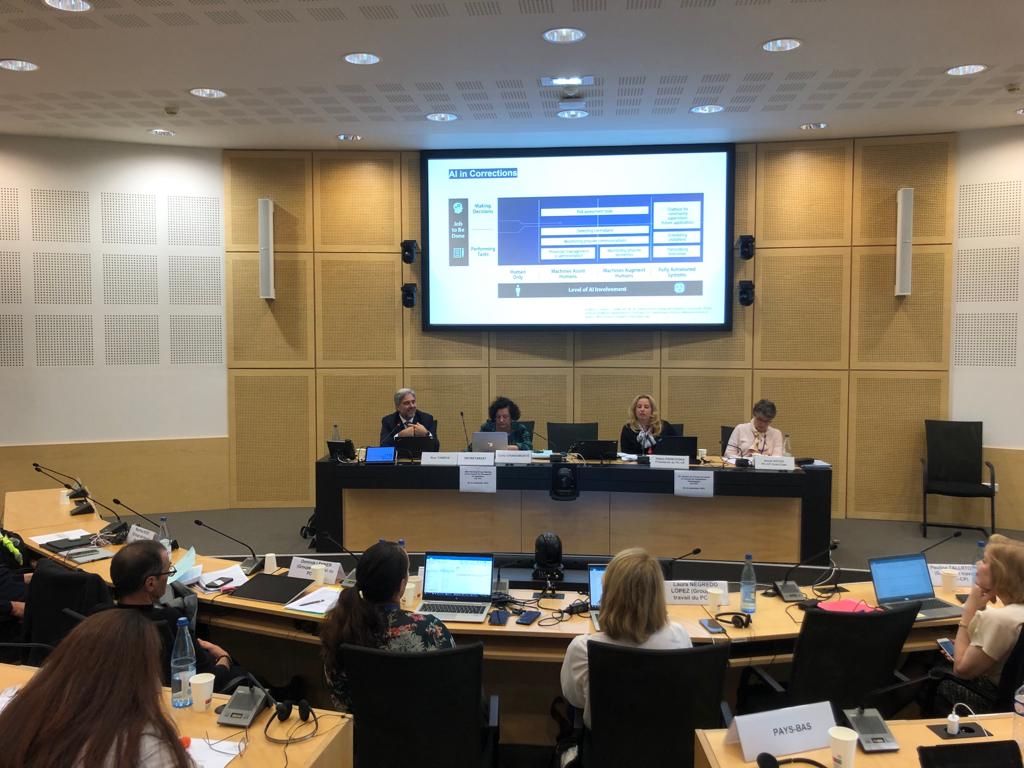At a time if increasing technological advances in all sectors, criminal justice organisations lack guidelines on the use of artificial intelligence (AI) and digital technologies. The concern is transversal to supranational entities across Europe, which is the Council of Europe has been working with scientific experts to reach a recommendation to guide the prison and probation services of its 46 Member States.
IPS_Innovative Prison Systems is closely keeping up to date with the entire process, with its CEO having been invited to make a presentation at the most recent meeting of the Working Group of the Council for Penological Cooperation (PC-CP).
Additionally, in 2021 the European Commission moved forward to propose a legal framework on AI. The focus of this instrument, in terms of objectives, was to address the risks associated with the use of artificial intelligence, defining harmonised rules on the matter and trying to take the lead at a global level.
On the use of artificial intelligence in prisons and probation services
To specifically deal with the issue of the use of AI by entities responsible for the execution of penal sentences – prisons and probation – the Council of Europe, through the Directorate General Human Rights and Rule of Law, involved several scientific experts to design a Recommendation to be issued to Member states. The document has undergone several revisions as it has been discussed within the framework of periodic meetings of the designated Working Group in the scope of the PC-CP.
The Draft Recommendation was presented and discussed at the most recent meeting, on September 23, 2022 in Strasbourg, France. Following this meeting, which had around 30 participants from various member countries, Pedro das Neves (IPS Innovation Prison Systems, BSAFE LAB Law Enforcement, Justice and Public Safety Laboratory, ICPA Board of Directors) gave a presentation entitled “The Beauty and the Beast’:
Reflection on the opportunities generated by Research, Regulation and Smart Use of AI in Criminal Justice”.
In his communication, the CEO and expert at IPS_Innovative Prison Systems, started by explaining the impacts that AI can have in terms of decision-making in justice systems, then made an overview of what European policy bodies have done with respect to regulation of the AI and highlighted that “In the digital era if we’re not moving forward, we are certainly moving backwards and increasing the digital divide between jurisdictions”.
The speaker explained the levels of use of AI by correctional administrations, among which the decision-making and the operative (performing of tasks) stand out.

Researching and developing an intelligent Offender Management System: the case of HORUS 360º iOMS
Through Pedro das Neves presentation, participants at the CoE Council for Penological Cooperation 30th Working Group Meeting became familiar with the HORUS 360º iOMS Research and Development project.
HORUS 360º iOMS will be supporting the management of criminal sentences life cycle. The IT project aims to research and design a solution that supports the management of operations and information generated during the detention “life cycle”, imprisonment or surveillance of persons subject to custodial and non-custodial judicial measures.
Through Artificial Intelligence and Predictive Analysis technology, the IT solution also seeks to support the rehabilitation process and judicial or administrative decision-making processes.
As leader of project promoter organisation, Pedro das Neves highlighted that HORUS 360º iOMS will contribute to increasing transparency and equity of decisions affecting those citizens involved in the criminal justice system and improving human, logistic, financial, and time resource management across criminal justice organisations. In addition, the solution will close the gaps caused by the lack of intelligent offender management solutions in criminal justice systems in Europe and beyond.
This project consortium (IPS, BSAFE Lab / UBI and iTech-ON) is fully committed to compliance with EU and International Directives, Framework Decisions, Standards and Recommendations in relevant areas for the use of the OMS, namely regulatory and international conventions on justice and law enforcement, protection of rights, standards and data.
One of the critical components of an intelligent offender management solution is risks and needs assessment tools, something that the HORUS 360º iOMS project will integrate into the technological solution that is under development. An innovative element to the OMS now in production is the integration of fully parameterizable tools to provide predictive analysis and support to decisions, considering risk of recurrence based on the assessment of risks, needs and responsivity (RNR) supported by scientifically validated models.
Know more about this project

HORUS 360 iOMS
Intelligent Offender Management System
Related news

New IPS-led initiative unites efforts to protect religious communities, schools, and places of worship
Read More »
IPS contributes to shaping EU’s future agenda on radicalisation prevention at Brussels Town Hall meeting
Read More »






